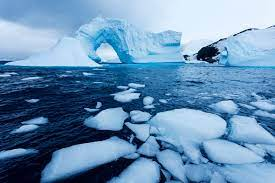The Effects of Climate Change

Antarctica on June 13, 2016. (Edited by author Joshua Murphy)
According to National Geographic, a glacier the combined size of California and Alaska is heading towards us as I am typing this right now. If climate change is not addressed we could be in grave danger.
Based on studies by BBC News, the world produced nearly 34 billion metric tons of carbon dioxide from fossil-fuel burning, cement production, and gas flaring in 2010. These actions have made lasting impacts on the earth’s ozone layer. The record for the warmest year in 2015 was subsequently broken in 2016. Temperatures have risen 1.69 degrees Fahrenheit since the 20th century, thereby causing a catastrophic loss of ice worldwide. Additionally, global sea levels rose about 8 inches in the last century but the sea level rate in the last two decades has nearly doubled that of the past and is accelerating slightly every year. Since the beginning of the Industrial Revolution, the acidity of ocean waters has increased by 30 percent. This increase is caused by humans emitting more carbon dioxide into the atmosphere and because of that more CO2 is being absorbed into the oceans. The amount of gases absorbed by the upper layer of the oceans is increasing by about 2 billion tons per year.
So what caused these colossal changes?
Greenhouse gases are one of the major causes for climate change. These gases are destroying our environment. Burning fossil fuels and much more are releasing bad toxins into the air, and are contributing extensively to Greenhouse gasses.
Another factor contributing to climate change being as bad as it is because of volcanoes. When volcanoes erupt tons of sulfur dioxide and ash are released into the atmosphere.
According to Katherine Schulten from the New York Times, another cause of climate change is that the earth makes one full orbit around the sun each year. It is tilted at an angle of 23.5 degrees to the perpendicular plane of its orbital path. Changes in the tilt of the earth can lead to small but climatically important changes in the strength of the seasons, more tilt means warmer summers and colder winters, less tilt means mild summers and winters.
If we don’t clean up the Earth now, we will be leaving a mess for our grandkids to clean up, but then it will be too late.





